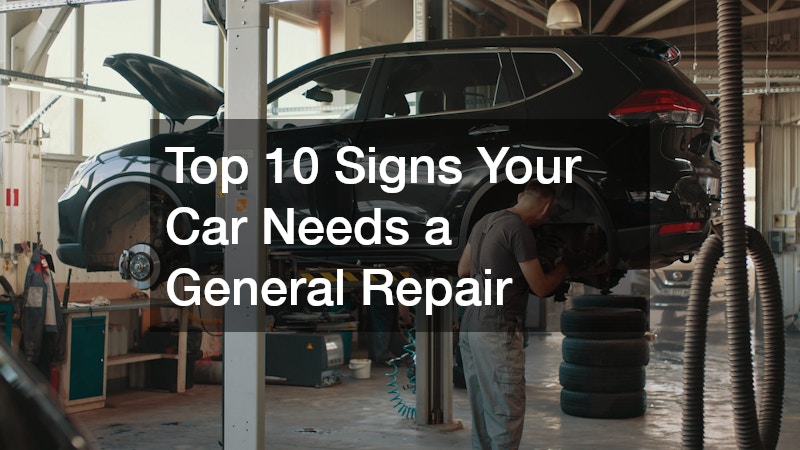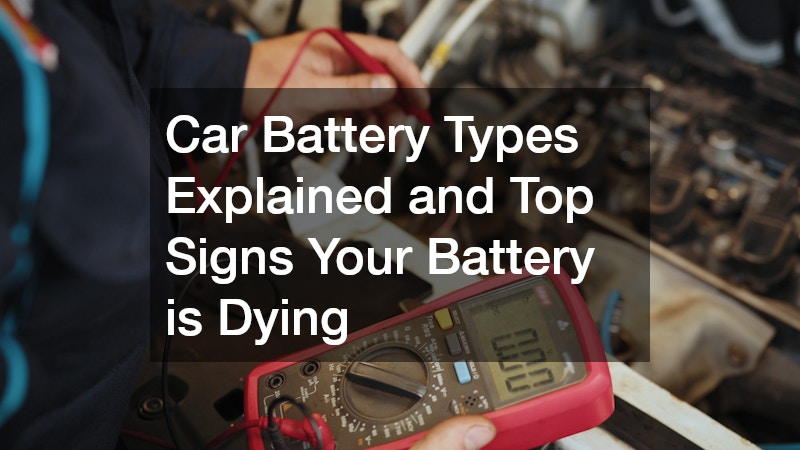
- Dashboard warning lights are early indicators of deeper mechanical or electrical issues—never ignore them.
- Strange noises like grinding, squealing, or knocking often signal urgent problems with brakes, engine, or suspension.
- Leaking fluids (oil, coolant, brake fluid) are a critical red flag that requires immediate inspection by an auto mechanic for general repairs.
- Poor fuel efficiency and sluggish performance could point to engine or transmission trouble needing prompt attention.
- Vibrations, pulling, or poor handling are often tied to tire, alignment, or steering issues that affect safety.
- Unusual smells like burning rubber or gasoline can indicate hazardous malfunctions that shouldn’t be ignored.
- Regular inspections and proactive repairs by a certified auto mechanic can prevent minor issues from becoming costly breakdowns.
Introduction
Your vehicle is more than just a mode of transportation—it’s your daily companion, your weekend adventurer, and sometimes even your mobile office. But like any complex machine, it requires regular care and attention. Ignoring small warning signs can quickly turn into major mechanical problems, unexpected breakdowns, or expensive repair bills. That’s why recognizing the early indicators of trouble is crucial.
Whether it’s strange noises, fluid leaks, performance issues, or dashboard warning lights, these are often your car’s way of asking for help. Knowing when to take your vehicle to an auto mechanic for general repairs not only keeps you safe on the road, but also extends the lifespan of your car and saves you money in the long run.
In this detailed guide, we’ll break down the top 10 signs that signal it’s time to visit a qualified auto mechanic. We’ll also share expert tips, preventative strategies, and what to expect from a trusted repair service, so you can make informed decisions and stay ahead of potential issues.
1. Unusual Noises Under the Hood
Unfamiliar sounds from your vehicle are one of the earliest red flags indicating that something may be wrong. Squealing, grinding, knocking, or hissing noises usually originate from failing components like brakes, belts, or engine parts. For example, a squealing sound when braking could mean worn-out brake pads, while a knocking noise may indicate engine detonation or worn bearings—both of which are serious issues that require immediate attention from a skilled auto mechanic for general repairs.
Ignoring these sounds can escalate the problem, leading to more expensive and complex repairs. A trustworthy auto repair shop will typically use diagnostic tools to pinpoint the noise source. A certified technician will inspect moving parts, fluids, and belts to ensure everything is in working order. A thorough inspection might reveal a loose serpentine belt, low transmission fluid, or even a damaged timing chain.
To protect your engine’s longevity, schedule a diagnostic check as soon as you notice new or persistent sounds. Whether you’re a daily commuter or an occasional driver, your best option is to consult a local auto mechanic for general repairs before small issues become significant.
Tips:
- Don’t ignore persistent noises—even if they seem minor.
- Record when and under what conditions the noise occurs.
- Get a mechanic’s diagnosis early to avoid major breakdowns.
2. Dashboard Warning Lights Are On

Dashboard warning lights serve as your vehicle’s internal communication system. When lights like “Check Engine,” “ABS,” or “Oil Pressure” illuminate, it means the onboard diagnostic system has detected an issue. These warnings should never be ignored. They could indicate problems ranging from minor sensor malfunctions to severe engine or transmission failures.
For example, a blinking check engine light could point to a misfiring engine—a problem that can lead to catalytic converter damage if left unresolved. Other warning lights, like the battery indicator, could suggest an issue with your alternator or battery charge level.
Auto mechanics for general repairs have the tools needed to scan your car’s computer system. Using an OBD-II scanner, they can identify the error code and interpret it accurately. While some drivers may opt for DIY diagnostics, a professional repair facility ensures accurate interpretation and proper fixes, not just code clearing.
When in doubt, pull over safely and schedule an appointment with a certified auto mechanic for general repairs. Acting promptly can prevent further damage and save you money in the long run.
Tips:
- Never ignore a flashing warning light.
- Use an OBD-II scanner to check codes, but get a professional diagnosis.
- Address the issue early before it escalates into a costly repair.
3. Poor Fuel Efficiency
If you find yourself filling up your gas tank more often than usual, your car could be suffering from reduced fuel efficiency. This issue is often tied to engine misfires, clogged fuel injectors, dirty air filters, faulty oxygen sensors, or even underinflated tires—all of which can be diagnosed and resolved by a reputable auto mechanic for general repairs.
Even subtle changes in fuel economy can point to underlying mechanical problems. A 10% drop in efficiency may not seem like much, but over time, it leads to increased costs and potential engine stress. An engine that’s struggling to maintain power often consumes more fuel to compensate, reducing overall performance.
Your mechanic will likely inspect the vehicle’s air intake, spark plugs, and emission control systems to locate the cause. If neglected, this seemingly minor issue can evolve into more severe problems such as damaged catalytic converters or complete engine failure.
Routine maintenance and timely repairs are key. Consult your local auto mechanic for general repairs to evaluate engine performance and restore your vehicle’s optimal fuel economy.
Tips:
- Monitor your MPG regularly.
- Replace air filters and oxygen sensors as recommended.
- Inflate tires to the correct pressure to improve fuel economy.
4. Vibrations or Shaking While Driving
Experiencing vibrations through the steering wheel, floorboard, or even your seat can be unsettling—and it’s typically a sign that your car needs attention. Common culprits include unbalanced tires, misaligned wheels, worn suspension components, or even damaged driveshafts.
These issues don’t just affect your comfort; they also compromise safety. A vibration at certain speeds often points to imbalanced tires or warped brake rotors, while steering wheel shimmy can indicate issues with alignment or ball joints. If you experience sudden or worsening shaking, schedule an inspection immediately.
An auto mechanic for general repairs will test your vehicle using computerized wheel alignment tools and physical component inspections. They’ll check for loose parts, assess tire treads, and examine bushings and joints that may wear out over time. Resolving these problems early prevents further damage to your suspension and drivetrain.
Prolonged vibration can even lead to uneven tire wear, reducing your tires’ lifespan and increasing the risk of blowouts. To stay safe and protect your vehicle’s handling, visit a professional auto repair shop at the first sign of vibration.
Tips:
- Don’t wait to get your tires balanced or rotated.
- Get alignment checks at least once a year.
- Replace worn suspension components promptly.
5. Trouble Starting the Engine
There’s nothing more frustrating than a car that won’t start. This issue can stem from a range of causes, such as a dead battery, faulty starter motor, corroded connections, or fuel delivery issues. Determining the root cause often requires diagnostic expertise from a skilled auto mechanic for general repairs.
Sometimes the issue is as simple as a drained battery due to a dome light left on overnight. However, repeated failures or stuttering starts might point to deeper issues. For example, a malfunctioning crankshaft position sensor or clogged fuel filter can prevent combustion altogether.
Mechanics will typically start by testing the battery voltage and then move on to the starter system and fuel pump. If necessary, they’ll also examine your ignition system, including the spark plugs and ignition coil. An accurate diagnosis saves time, money, and frustration.
Addressing starting issues promptly is critical—not only for convenience but also to avoid being stranded. For consistent performance, rely on your local auto mechanic for general repairs and battery services.
Tips:
- Check your battery terminals for corrosion.
- Turn off lights and electronics before leaving the car.
- Don’t repeatedly crank the engine—it can worsen damage.
6. Poor Fuel Efficiency
If you’re noticing more frequent trips to the gas station without a change in driving habits, your vehicle’s fuel efficiency may be declining. Several issues can contribute to this problem, including dirty air filters, malfunctioning oxygen sensors, or problems in the fuel injection system. While it might seem like a minor inconvenience at first, poor fuel economy can become a financial burden over time and may be a sign of a deeper issue that needs professional attention.
Tips:
- Track your fuel consumption regularly.
- Replace air filters every 12,000 to 15,000 miles.
- Use fuel injector cleaners periodically.
- See an auto mechanic for general repairs if fuel efficiency suddenly drops.
7. Electrical Issues (Lights, Windows, Dash Indicators)

Modern vehicles are packed with electrical components. When these begin to fail—such as power windows that won’t go up, lights that dim or flicker, or dashboard indicators that don’t work properly—it could signal issues with the battery, alternator, wiring, or fuses. These problems can become safety hazards, especially if they affect headlights or brake lights.
Tips:
- Check fuses before assuming major electrical problems.
- Look for corrosion around battery terminals.
- Consult an auto mechanic for general repairs when multiple electrical systems fail at once.
8. Fluid Leaks (Oil, Coolant, Transmission Fluid)
Noticing puddles or spots under your car is a clear sign that your vehicle is leaking fluid. Each type of fluid—oil (brown or black), coolant (green or orange), transmission fluid (red), brake fluid (clear to amber)—serves a critical purpose. Ignoring leaks can lead to severe engine damage, overheating, or brake failure.
Tips:
- Use cardboard under the car to identify fluid color and source.
- Regularly check fluid levels.
- Address even small leaks immediately with a trusted auto mechanic for general repairs.
9. Strange Odors (Burning, Gasoline, Musty Smell)
Unusual smells can be early indicators of serious problems. A burning smell might indicate overheated brakes or a slipping clutch. The scent of gasoline could signal a fuel leak, while a musty odor could mean mold in the air conditioning system. These odors should never be ignored, as they can point to safety and health risks.
Tips:
- Pay attention to when the smell appears (e.g., after driving or when turning on the AC).
- Keep your cabin air filter clean.
- Consult a mechanic if smells persist.
10. Rough Idling or Difficulty Starting
Your car should idle smoothly without shaking or sputtering. If you experience rough idling, slow cranking, or multiple attempts to start the engine, the issue could be with the spark plugs, ignition system, battery, or starter. These are clear signs that you need the attention of an experienced auto mechanic for general repairs.
Tips:
- Replace spark plugs as part of routine maintenance.
- Monitor the battery’s age and performance.
- Don’t ignore the check engine light if paired with starting issues.
Conclusion
Your car speaks to you in its own language—through sounds, smells, warning lights, and how it feels on the road. The more you learn to recognize these signals, the better equipped you are to take swift action. Ignoring signs of wear and malfunction can lead to unsafe driving conditions, costly repairs, or even permanent vehicle damage.
The good news? Most general repair issues can be resolved quickly and affordably when addressed early. By building a relationship with a trustworthy auto mechanic for general repairs (Consumer Reports), you ensure your vehicle receives the care it needs from professionals who understand its intricacies.
For added peace of mind, review the National Highway Traffic Safety Administration’s (NHTSA) vehicle safety tips to understand how regular maintenance impacts road safety. You can also consult AAA’s car maintenance checklist to stay proactive and prevent minor issues from becoming major headaches.
Whether it’s a strange noise, a dashboard alert, or just a sense that something’s not right, don’t wait. Schedule that check-up and keep your ride running smoothly, safely, and efficiently—mile after mile.
❓ FAQ Section
Q1: How often should I take my car in for general repairs or inspections?
A: It’s best to have your car inspected every 6 months or every 5,000–7,000 miles, even if there are no obvious problems. This helps catch issues early and reduce long-term costs.
Q2: Can I ignore minor car issues if the car is still running?
A: Ignoring minor problems can lead to major (and costly) repairs later. Even small symptoms, like strange noises or warning lights, should be checked by a professional.
Q3: Are general repairs covered by car insurance?
A: Typically, general repairs are not covered unless they’re related to an accident. Maintenance and wear-and-tear issues are usually your responsibility.
Q4: How do I know if a mechanic is qualified for general auto repairs?
A: Look for ASE certification, good online reviews, and transparent communication. A good mechanic should provide a clear estimate and explain repairs in simple terms.
Q5: What’s the average cost of general car repairs?
A: Depending on the issue, general repairs can range from $100 to $1,000+. Always ask for a written quote and diagnostic before authorizing work.



